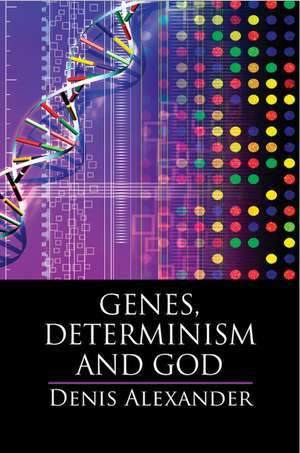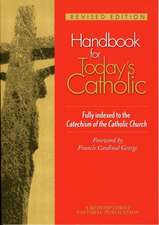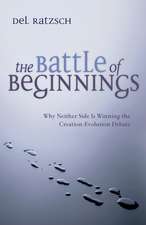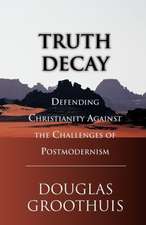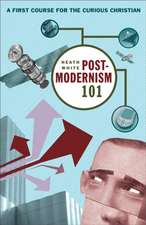Genes, Determinism and God
Autor Denis Alexanderen Limba Engleză Paperback – 9 iul 2017
Preț: 273.89 lei
Nou
Puncte Express: 411
Preț estimativ în valută:
52.41€ • 54.87$ • 43.36£
52.41€ • 54.87$ • 43.36£
Carte tipărită la comandă
Livrare economică 07-21 aprilie
Preluare comenzi: 021 569.72.76
Specificații
ISBN-13: 9781316506387
ISBN-10: 131650638X
Pagini: 392
Dimensiuni: 152 x 227 x 22 mm
Greutate: 0.54 kg
Editura: Cambridge University Press
Colecția Cambridge University Press
Locul publicării:New York, United States
ISBN-10: 131650638X
Pagini: 392
Dimensiuni: 152 x 227 x 22 mm
Greutate: 0.54 kg
Editura: Cambridge University Press
Colecția Cambridge University Press
Locul publicării:New York, United States
Cuprins
1. Human personhood fragmented?: nature-nurture discourse from antiquity to Galton; 2. Reifying the fragments?: nature-nurture discourse from Galton to the twenty-first century; 3. The impact of the new genetics?: how contemporary biology is changing the landscape of ideas; 4. Reshaping the matrix: integrating the human in contemporary biology; 5. Is the worm determined?: gene variation and behaviour in animals; 6. Prisoners of the genes?: understanding quantitative behavioural genetics; 7. Behavioural molecules?: understanding molecular behavioural genetics; 8. Mensa, mediocrity or meritocracy?: the genetics of intelligence, religion and politics; 9. Gay genes?: genetics and sexual orientation; 10. Not my fault?: the use of genetics in the legal system; 11. Causality, emergence and freedom?: tackling some tough philosophical questions; 12. Made in the image of God?: a conversation between genetics and theology.
Recenzii
'Overall, Genes, Determinism and God is worth reading not just for the detail it provides on developments in genetics, but also for its thought-provoking pointers. Denis Alexander has achieved considerably more than his goal at the start of removing barriers to religious belief based on incorrect views of genetic determinism.' Celia Deane-Drummond, The Times Literary Supplement
'The genetic book of life, it seems, does not in the end offer any shortcuts to the meaning of human existence. Rather, like most sacred texts, it demands careful, patient, sceptical exegesis, which is exactly what Denis Alexander has granted it.' Nick Spencer, The Tablet
'All in all, this is a remarkable and highly informative overview.' David Lorimer, Paradigm Explorer
'Denis Alexander brings us a feast of the biology of genetics, layered with legal and philosophical implications and garnished with a dollop of theological considerations.' Barbara Pfeffer Billauer, Metascience
'Anyone who wants to know the current state of scientific research in genetics, and its relevance to difficult issues about human development, including the vexed issue of sexual orientation, will find in this book a masterly and balanced survey. It comes from someone who is well aware of the enormous implications for theology of current research, and, in particular, its relevance to arguments about free will.' Roger Trigg, Theology
'The genetic book of life, it seems, does not in the end offer any shortcuts to the meaning of human existence. Rather, like most sacred texts, it demands careful, patient, sceptical exegesis, which is exactly what Denis Alexander has granted it.' Nick Spencer, The Tablet
'All in all, this is a remarkable and highly informative overview.' David Lorimer, Paradigm Explorer
'Denis Alexander brings us a feast of the biology of genetics, layered with legal and philosophical implications and garnished with a dollop of theological considerations.' Barbara Pfeffer Billauer, Metascience
'Anyone who wants to know the current state of scientific research in genetics, and its relevance to difficult issues about human development, including the vexed issue of sexual orientation, will find in this book a masterly and balanced survey. It comes from someone who is well aware of the enormous implications for theology of current research, and, in particular, its relevance to arguments about free will.' Roger Trigg, Theology
Notă biografică
Descriere
How does genetic variation impact on behavioural differences and how does this relate to free will and personal identity? Denis Alexander examines these questions.
